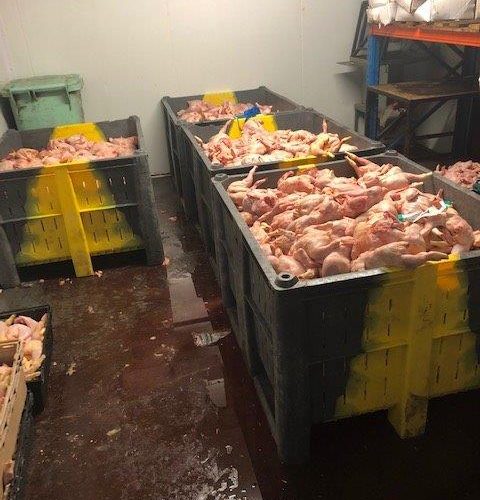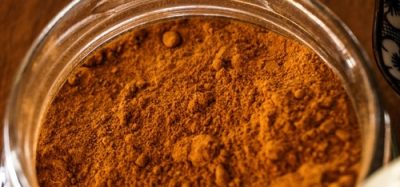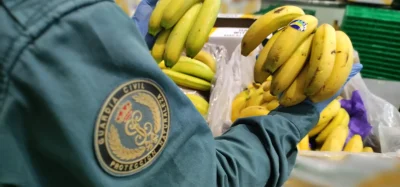From tip-off to convictions: inside the battle against food crime
Posted: 3 September 2025 | Professor Chris Elliott | No comments yet
Professor Chris Elliott gives exclusive sobering insight into the criminal undertakings of trusted food industry actors – highlighting the extensive work that’s necessary to uncover the source of food fraud.


Rotting whole chickens, out-of-date lambs' testicles and even retail-packed Scotch burgers were all found by inspectors in the secret cutting room. This meat was being prepared to be sold for human consumption.
When I read on the BBC website about two men being sent to prison for supplying meat unfit for humans, I wanted to learn more about the case. Based on information in the public domain – and more importantly some phenomenal additional insight from Andy Quinn, the Food Standards Agency’s Head of National Food Crime Unit (NFCU) – I decided to share with New Food readers the complexity of investigating such a case and what it takes to successfully bring perpetrators to justice.
It began back in 2020 when residents in the London district of Southwark first complained of a horrible stench drifting from a back-street shop. These residents were literally sniffing out a major food fraud operation right where they lived. The resulting complex and painstaking investigation eventually exposed a trail of dodgy meat that started from legitimate abattoirs in Devon and Wales, then passed through a multimillion-pound Somerset processing firm before ending up on the plates of unsuspecting consumers across London. The fraud was organised by a wealthy meat industry insider who chose ‘greed over trust’. His criminality led to meat already deemed not fit for human consumption being processed in a hidden cutting room so filthy that even hardened inspectors were appalled – you can see this yourself from the photos.
The unfolding of the criminal activity
The breakthrough came in March 2020 when the NFCU received intelligence about an unlicensed meat facility operating out of an area in Southwark, south London. The information was passed to Trading Standards Officers who subsequently raided the premises and uncovered a secret cutting room. There they witnessed a nightmarish scene of tons of whole chickens rotting in bins along with out-of-date lambs’ testicles and even retail-packed Tesco Scotch burgers, all of which should have been destroyed or diverted to pet food. Instead, they were being prepared for sale to unsuspecting consumers in utterly filthy conditions. The scale of risk in terms of food safety can only be described as immense. On top of this, some of the meat was sold to local food outlets as Halal, a complete breach of religious trust.


Hidden from the public, this filthy cutting room was the central point of a major food fraud operation. It was here that tons of rotting chicken and out-of-date meat were prepared to be sold to unsuspecting consumers
The journey from Devon and Wales to a back-street cutting room
When I read the BBC article I wondered if there was a link to this case and the massive amounts of meat being smuggled into the UK via Dover, but I was wrong. The exemplary detective work of the NFCU successfully traced the origin of the meat; it hadn’t come from shady smugglers or illegal imports, but from some of the UK’s largest legitimate processors: Two Sisters Food Group in Devon and Kepak in Merthyr Tydfil. Neither company was involved in the fraud in any way and both firms had correctly declared the consignments as ‘Category 3 Animal By-products’ (ABP), material unfit for human consumption, to be used only in pet food or destroyed. This waste material had been sent to Fears Animal Products in Bridgwater, Somerset. According to Companies House, Fears Animal Products Ltd has been registered since 1996 with the principal activity of manufacturing pet foods.
On paper Fears appeared to be a trusted partner in a highly regulated supply chain. It held a licence from DEFRA to handle ABP and had a contract worth over £1 million a year with Sarval, the pet food subsidiary of European giant Saria. The company’s role was very straightforward: store and consolidate ABP before onward shipment to pet food manufacturers. But Fears identified and capitalised on a glaring weakness in the overall monitoring of the integrity of the supply chain in ABP. With large volumes of material being traded, discrepancies of one or two tons a week seemed to be accepted by buyers, attributed to paperwork errors or wastage. Antony Fear exploited this weakness to make large amounts of money.
The master food criminal: Anthony Fear
Anthony Fear – a 64-year-old multimillionaire with more than 40 years’ experience in the meat trade – played the central role in the fraud. Sometimes food fraud is driven by companies or individuals under pressure financially, but Fear was far from a struggling businessman. He was a consultant to Saria, pocketing nearly £10,000 a month while also managing lucrative property interests in Somerset. He didn’t need the money but as the judge would later remark, he was “a greedy man who was prepared to place his greed above trust, regulation and public safety.” In my words, Fear is a despicable rogue who put money ahead of protecting people.
Evidence from the trial showed Fear directed his manager, Mark Hooper, and conspired with a London butcher named Azar Irshad. Between June and September 2020, Irshad made at least 16 trips from London to Bridgwater, collecting approximately a ton of diverted poultry and red meat each time. Each vanload was clearly documented as going to make pet food but instead, it was driven back to the hidden cutting room in Southwark, processed and sold on as food for humans.
The Walworth Road Operation
The London end of the conspiracy was run by Azar Irshad, a 40-year-old butcher. Not surprisingly this man has previous convictions for food safety breaches dating back to 2018. Despite advertising his business as Halal, Irshad sold chicken and lamb that was neither safe nor compliant with the strict religious standards of this class of meat. The judge in the case called this “a further and serious aggravating factor”, a total betrayal of a community that trusted him.
This rogue wasn’t operating alone. He drew co-workers and family members into his web of deceit and one of these, Ali Afzal, was found guilty of running an unapproved premises. It seems clear to me, however, that Irshad was key in turning Fear’s stolen ABP into food trade.
The investigation: painstaking, protracted but vital
Many observers will wonder why a tip-off in 2020 resulted in a prosecution five years later. The reason for this is that investigating the causes of fraud, be it food, financial or any other form of business malpractice, is generally highly complex. The criminals are very good at covering their tracks and huge amounts of documents, phone records and bank transactions, etc need to be investigated. This case was no different and the NFCU in support of Southwark Council launched a forensic investigation code named Operation Bantam following the tip-off.
These residents were literally sniffing out a major food fraud operation right where they lived.”
Intelligence analysts pored over months of mobile phone data, matching cell site records to van journeys, proving Irshad’s repeated trips from Bridgwater to London. Financial investigators tracked the gains, estimating the fraud at well over £50,000, a figure the judge described as a “bare minimum” since the scam was only stopped by the actions of enforcement officers. More than 140 witness statements were gathered during the investigation. All these details collectively produced a concrete body of evidence strong enough to survive several aborted trials during the five-year period. On two occasions the trial collapsed – the first time due to a defendant’s ill health and the second due to scheduling overruns in the court. It was not until January 2025 that the criminal proceedings began in earnest.
The guilty pleas and convictions
Ultimately, three men pleaded guilty. Mark Hooper, the manager at Fears, admitted his role but argued he had acted under Fear’s orders. He also pleaded guilty to conspiracy charges relating to a separate matter in Aylesbury. He received a two-year suspended sentence with 200 hours of unpaid work. Azar Irshad pleaded guilty to conspiracy to defraud and four regulatory offences. He was jailed for 35 months, banned indefinitely from any food business and barred from selling food products at all. Ali Afzal admitted regulatory offences and received a suspended six-month term.
That left Anthony Fear, the ring leader, and his company to face trial. In March 2025, after 11 weeks of evidence, both were unanimously found guilty by the jury. On 26 August 2025, Judge Noel Lucas KC handed Fear 42 months in prison and disqualified him from running a company for at least six years – a period of time when Fear will be enjoying porridge a lot more than dodgy meat.
The words of the judge nicely summed up the actions of Fear: “You had absolutely no need, whether financial or in any other way, to involve yourself in this criminality. This was sheer greed and a gross dereliction of the trust placed in you.”
The wider impacts of the case
Beyond the events in the courtroom, Operation Bantam carries sobering lessons for the food industry, not only in the UK but wherever meat and ABPs are traded. I have harboured concerns about the robustness of the ABP trade dating back to the review of the UK food system I undertook following the Horsemeat Scandal. I believe that oversight in the animal by-products sector must be improved to prevent major food safety incidents. How can legitimate businesses tolerate mass balance discrepancies worth thousands each month? Such inaction facilitates the creation of a small mountain of unaccounted meat that is not fit for human consumption. Are they simply turning a blind eye to a difficult problem?
I have harboured concerns about the robustness of the ABP trade dating back to the review of the UK food system I undertook following the Horsemeat Scandal.”
In so many cases of food fraud I have studied there is a clear impact on consumers. How many people became ill because of the criminal activity of Fear and others like him? There is very little data and no reliable statistics about this apart from a few cases where serious illness and even deaths result. There is also the Muslim community to consider as many were tricked into buying meat products falsely sold as Halal.
We must also consider the impact on legitimate UK food business operators. There are a staggering 600,000-plus of these and the vast majority set out to deliver safe, affordable and authentic food to the public. In the present case I have no doubt many legitimate butchers and meat traders were undercut by the fraudsters and suffered financially. How many other cases are there like this going on across the country currently?
Finally, I would like to address the subject of trust. Fear was a meat industry veteran, trusted by DEFRA, employed as a consultant by one of Europe’s largest renderers and was operating under an official licence. If such an industry figure can cheat the system for profit, how resilient are all the safeguards currently in place to protect consumers? The former US President Ronald Reagen famously said during the Cold War, “trust, but verify”. Wise words then and no different in the food industry today.
Looking ahead
This story is far from over. Confiscation proceedings will now seek to strip the defendants of their criminal gains. The NFCU is undertaking numerous ongoing live investigations into other food fraud cases, with some of these already in the criminal justice system as they continue to push for vigilance across the sector and indeed the entire UK food system. As one of the investigators noted, cases like this remind us that food crime is not confined to exotic imports or rogue fly-by-nights; it can and does thrive within the cracks of legitimate supply chains, fed by too much complacency, trust and greed. I implore all, inside or outside of the food industry, to let the NFCU know of any suspicions they have, be they large or small.
Andy Quinn paid tribute to the collaborative efforts of all involved in the investigation: “This successful prosecution highlights the vital importance of collaboration between the NFCU and local authorities like Southwark, Somerset and Devon councils in protecting consumers from food crime and we are grateful for the tireless work of all who played a role in securing this outcome.”
The importance of partnerships between his unit and local authorities across the country is vital to identify and investigate criminal activity in our food system.
The NFCU operates a food crime confidential hotline and in Scotland the Scottish Food Crime and Incidents Unit has a similar arrangement through Crimestoppers. I personally give my guarantee that all reports to both are treated with the strictest confidentiality and will be taken seriously.
You might be saving lives.
Food crime hotline numbers
- NFCU food crime confidential hotline: 0800555111
- Scottish Food Crime and Incidents Unit hotline via Crimestoppers: 08000287926









